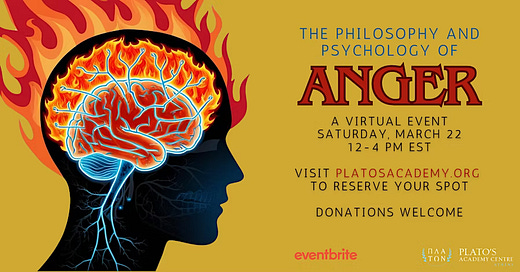Highlights: The Philosophy and Psychology of Anger
Our virtual event takes place one week from today
We created a unique virtual conference that tackles the problems associated with growing anger in modern society. Attendance is free of charge, although donations are always welcome. Video recordings will be available if you’re unable to attend live. This event is for everyone.
[Anger] like those who burn themselves up in their own homes, makes everything within full of confusion and smoke and noise, so that the soul can neither see nor hear anything that might help it. — Plutarch
Highlights
Learn about evidence-based therapy for anger from Prof. Raymond DiGiuseppe, St. John's University, director at the Albert Ellis Institute, and a leading expert in anger disorders and Rational Emotive Behavior Therapy (REBT),
Discover anger-management Aristotle’s way with Prof. Nancy Sherman, Georgetown University, author of Stoic Wisdom: Ancient Lessons for Modern Resilience.
Get inspired by the examples of Stoic anger-management in prisons with Andy Small, Physical Education Senior Officer HM Prison Service, and Stoic Philosophy teacher since 2016.
See our event listing for more details of the program.
You will hear from many other experts, including classicists, academic philosophers, cognitive-behavioral therapists, and psychologists carrying out research in this area. There will also be an interdisciplinary panel discussion, addressing questions from the perspective of philosophy, psychotherapy, and scientific research on anger.
Some age-old questions…
What is anger? Do we just feel angry or is it also a way of thinking?
Is all anger unhealthy, or are there good and bad forms of anger?
Does anger help motivate us to fight injustice? Or does it cloud our judgment and risk making us into tyrants ourselves?
How should we respond to our anger? By suppressing it, internalizing it, expressing it physically, or verbally, or in some other way?
How is anger related to fear, sadness, and other emotions? Do we only become angry when our feelings have already been hurt?
How did anger evolve through natural selection? Is it still adaptive in modern society or is it now an obsolete relic from the past?
Can modern psychologists and therapists learn anything of value about anger from ancient philosophers, such as the Stoics?
Join us if you’re interested in exploring these and other questions!
Stay tuned because, over the next week or so, we’ll be sharing more details with you here, including the full program of speakers.





